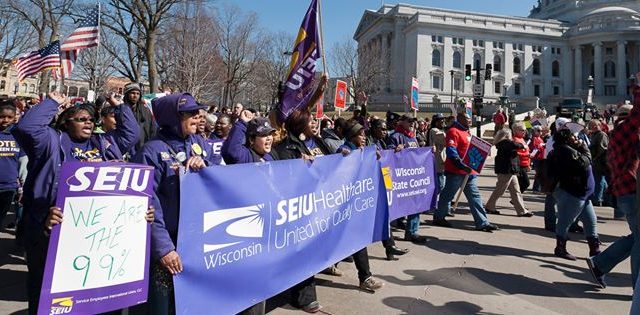UW agency coordinated with liberal groups on minimum wage study

TEAMWORK: Several left-leaning organizations, including Service Employees International Union, have coordinated with a University of Wisconsin agency on an October report calling for a minimum wage increase.
By Adam Tobias | Wisconsin Reporter
MADISON, Wis. — Laura Dresser, associate director of the University of Wisconsin’s Center on Wisconsin Strategy, has once again helped her friends on the left.
Dresser coordinated with Service Employees International Union, Wisconsin Jobs Now and the Economic Policy Institute on an October report supporting those organizations’ positions on increasing the minimum wage, according to emails obtained by Wisconsin Reporter through the state’s open records laws.
Dresser, who signed the petition in 2011 to recall Republican Gov. Scott Walker and participated in protests at the Capitol over Walker’s signature collective bargaining reforms, also worked with the three agencies on at least two other minimum wage studies released in the past year.
Wisconsin Jobs Now is funded by SEIU and has received more than $2.5 million since 2011. The EPI, whose board of directors is chaired by American Federation of Labor and Congress of Industrial Organizations President Richard Trumka, has nearly 20 labor unions donating to its causes.
James Sherk, a senior policy analyst in labor economics for the Heritage Foundation, told Wisconsin Reporter it’s easy to understand why unions and liberal groups want to involve themselves with COWS, especially when some Democratic lawmakers and left-leaning media outlets tout the reports.
A minimum wage hike could raise the earnings of union members by 20 percent to 40 percent, Sherk said. But unskilled, non-union employees are likely to see their income drop because of reduced working hours and fewer job opportunities, he added.
“Basically, by raising the minimum wage, you make the competitors with the union more expensive for the businesses to buy,” Sherk said.
Since wage increases help union members earn more money, union administrators will also cash in with higher dues from workers, according to Sherk.
“I think the union folks supporting a higher minimum wage are quite sincere when they say that they believe this will benefit the economy and it will be a good thing,” Sherk said. “But it’s a policy that will particularly benefit their members, and the people who face the downsides, the negative costs of the higher minimum wage, tend not to be union members.”
State Rep. Chris Kapenga, R-Delafield, told Wisconsin Reporter he’s aware of COWS’ perceived political bias and noted that lawmakers need to be mindful that the UW agency’s reports could include misinformation.
“If the UW system is going to come out and we know that they lean left — that’s not a surprise to anybody – we understand that when we look at the statistics that are given,” Kapenga said.
COORDINATION: Center on Wisconsin Strategy Associate Director Laura Dresser says her reports are accurate, despite outside groups submitting information.
Dresser, a staunch supporter of unions, told Wisconsin Jobs Now community organizer Peter Rickman in an October 2013 email she wasn’t confident in the numbers he supplied for a December COWS study looking at the fiscal impact of a “living wage” in Milwaukee County.
“I do feel a bit constrained about how much we really can stand by these estimates,” Dresser said in the email, obtained by Mediatrackers.
But Dresser on Wednesday defended her reports, telling Wisconsin Reporter she works off public data and never alters her figures to appease outside parties.
“I don’t think we’ve come under attack usually for the analysis because we play very clean and very conventional with our data,” Dresser said.
But that doesn’t change the fact organizations benefiting from a minimum wage increase are providing information for the reports .Kapenga says the authors can still mislead their readers by cherry-picking details.
“Give me what you want me to prove, and I will find numbers to prove it,” said Kapenga, a certified public accountant.
Several attempts to reach UW administrators for comment were unsuccessful.
Walker and the Republican-led Legislature have made it clear they do not intend to increase the state minimum wage of $7.25 an hour, but several Wisconsin communities have passed “living wage” laws for public employees and private firms that have government contracts.
But that could all change in 2015, since Kapenga expects to reintroduce his Assembly Bill 750, which would eliminate any local living wage laws that use state or federal funding.
“If it is 100 percent funded by the local municipality, we’re not going to step into local control,” Kapenga said. “But if (state) dollars are involved, it’s no longer just local control. I’m responsible for the taxpayers in my district and that’s how we approach this.”
Kapenga’s legislation didn’t make it onto the agenda of the Senate earlier this year because Majority Leader Scott Fitzgerald, R-Juneau, said it didn’t have enough votes to pass.
Following November’s general election, the Wisconsin Legislator bolstered its Republican majority in the Assembly and Senate.







